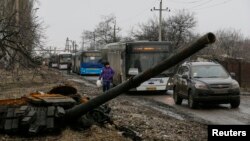As the United States weighs arming Ukraine’s military to bolster its fight against Russia-backed separatists, German Chancellor Angela Merkel and French President François Hollande have begun talks in Moscow to find a diplomatic solution to the crisis.
VOA’s Carol Castiel probed the issue with two experts. Steven Pifer is a senior fellow at the Brookings Institution and a former U.S. ambassador to Ukraine. William Pomeranz is Deputy Director of the Kennan Institute for Advanced Russian Studies at the Woodrow Wilson Center and a professor of Russian law at Georgetown University.
Castiel: Will sending lethal aid to Ukraine effectively force Russian President Vladimir Putin to escalate the Kremlin’s involvement in the conflict?
Pifer: “The risks of U.S. inaction are greater than the risks of action. What’s going on now in Eastern Ukraine is virtual warfare in places like Donetsk and Debaltseve. But escalation by the Kremlin poses a dilemma [for them] in that it would make this much more a Russian military conflict as opposed to the fiction they try to maintain that its mainly [fueled by] separatists. It becomes harder for them to hide from the Russian people that Russian soldiers are fighting and dying in eastern Ukraine. I don’t think Putin cares about [them], but he does care about the effect [these casualties] have on his poll ratings. Also, if the Russians become more overtly involved, it will likely increase European support for sanctions.”
Pomeranz: “Once you throw weapons into the equation, you create another variable. I think Putin is hesitant to put his stamp on [the conflict], to brand it as a pure Russian adventure. He’s shown that, by his unwillingness to annex Donetsk and Luhansk as he did so quickly with Crimea. At all stages Putin has decided to double down when confronted with a risk as opposed to finding a solution. There’s a risk that far from getting Putin to the negotiating table, the delivery of lethal weapons will give him a political and propaganda tool by which to up Russia’s level of participation.”
Castiel: What does Russia want to achieve with military escalation?
Pifer: “Everything we’ve seen since February 2014 is that the Russian objective is to destabilize Ukraine - create chaos and instability in the east, destabilize the government and make President Poroshenko’s life generally harder. [Russia wants] to complicate his effort to implement the [EU-Ukraine] Association Agreement that would draw Ukraine closer to the European Union and keep it from moving on the path to political and economic reform. This war makes that harder. At many points during the last eight months, Poroshenko has offered ideas responsive to what Russians have talked about: special status for Donetsk and Luhansk; official status for the Russian language; a way to implement the EU-Ukraine dialogue so that association with EU is not to the detriment of Ukraine; even taking NATO off table for a quite some period of time -- but Russia never picked up on these ideas. They could have, and put a package together that would have allowed Russia to say ‘we’ve met our objectives.’ The fact that they haven’t suggests to me they’re more interested in creating instability in Ukraine.”
Pommeranz: “I think Putin has chosen not to pursue these diplomatic objectives because he realizes, on a certain level, that if crisis is to end, and Russia gains Crimea, but loses Ukraine to West, then Russia has lost this entire engagement. In many ways, Russia has lost so much already. Putin helped forged a Ukrainian nation, that was much more divided beforehand, he’s pushed Ukraine to the West, they’ve signed the association agreement, and clearly, he’s changed the relationship, forever, between Russia and Ukraine. So, I think Putin has gambled and lost on that level, and that’s partly why he hasn’t been willing to compromise on eastern Ukraine.”
Castiel: Does the peace plan that German Chancellor Angela Merkel and French President François Hollande have taken to Moscow have any chance for success?
Pifer: “Its good thing they [Merkel and Hollande] are engaging Putin directly on this. It’s a chance to see whether Putin’s calculation has changed. To some extent, what we may be seeing is a “good cop, bad cop” thing. It’s not a bad thing that when Merkel and Hollande arrive in Moscow for the Russians to be focused on the fact that the U.S. is thinking in a very serious way of additional military assistance and, perhaps crossing the line and sending defensive weapons to the Ukrainian military. That allow Merkel and Holland to say ‘this is getting serious, we’re on the verge of taking a new step that will have huge costs to you’ and to press for something.”
Pomeranz: We’re not certain just what would satisfy Vladimir Putin. At some point, he has to solve the Ukraine crisis and still have enough money left over to solve his domestic economic crisis. At some point he has to make a calculation whether he is going to continue to run the risk in Ukraine or whether he’s going to try to find a way out of it so he can begin to turn to what are very serious economic issues at home. Recession is just about to hit Russia’s Main Street. It hasn’t hit it yet.”




